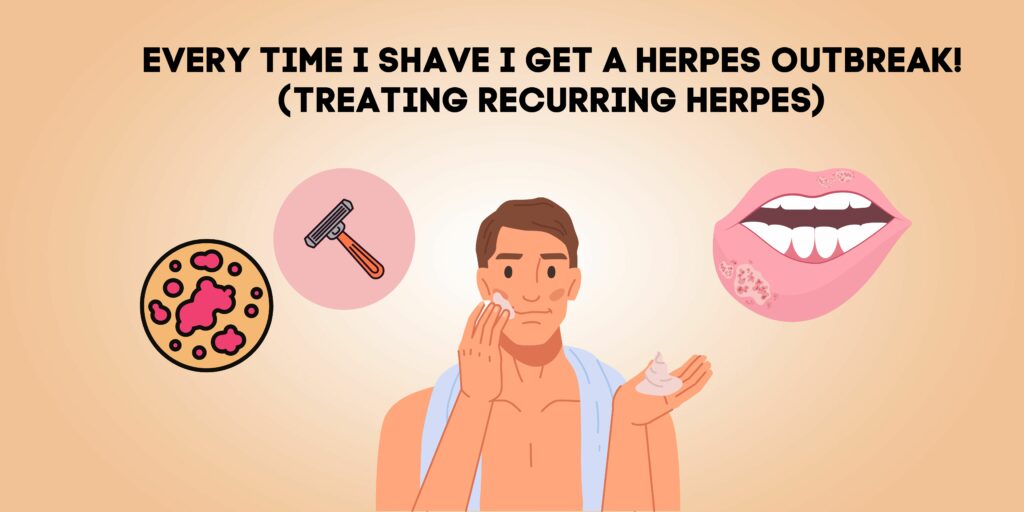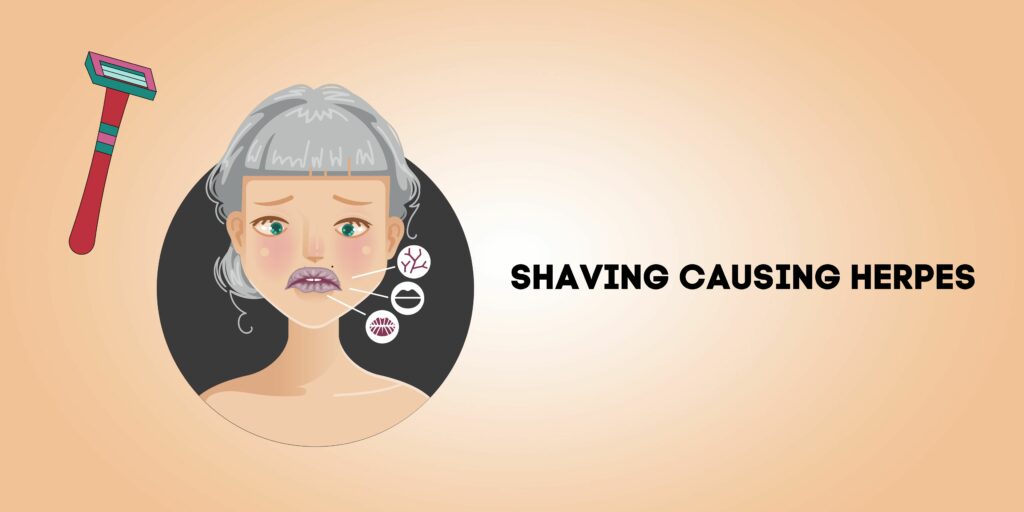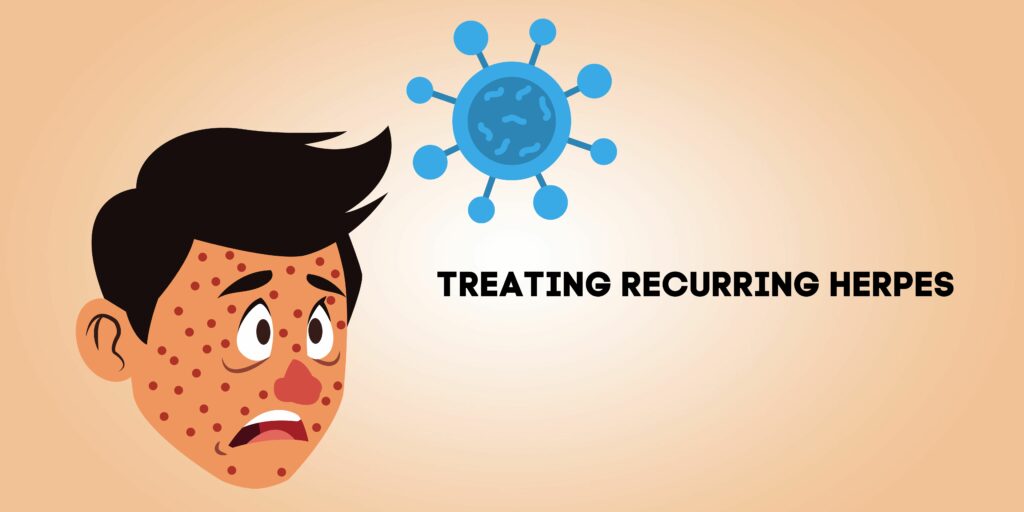
Recurring herpes outbreaks can be frustrating and disruptive, especially if they seem to be triggered by specific events such as shaving. If you find that every time you shave, you experience a herpes outbreak, it is important to understand the potential causes and to work with a healthcare provider to identify effective treatment options.
One possible reason why shaving may trigger a herpes outbreak is because of the trauma that occurs to the skin during the shaving process. Shaving can cause micro-tears in the skin, which can create an entry point for the herpes virus to infect the skin and cause an outbreak. Additionally, shaving can cause irritation and inflammation, which can weaken the immune system and make it more difficult to fight off a herpes infection.
To reduce your risk of experiencing a herpes outbreak after shaving, there are several steps you can take. These include using a sharp and clean razor, avoiding shaving when you have an active outbreak, and using a soothing aftershave lotion or cream to reduce irritation and inflammation.
If you continue to experience recurring herpes outbreaks despite taking these precautions, there are several treatment options that may be effective. These include antiviral medications, which can help to reduce the severity and frequency of herpes outbreaks, and topical treatments such as creams or gels that can help to soothe irritation and promote healing.
In addition to medication and topical treatments, there are several lifestyle factors that may help to reduce the frequency and severity of herpes outbreaks. These include managing stress, getting enough sleep, eating a healthy and balanced diet, and avoiding triggers such as excessive sun exposure or certain foods.
In conclusion, recurring herpes outbreaks can be frustrating and disruptive, especially if they seem to be triggered by specific events such as shaving. If you experience herpes outbreaks every time you shave, it is important to work with a healthcare provider to identify effective treatment options and to take steps to reduce your risk of future outbreaks. With proper care and management, individuals with recurring herpes outbreaks can lead healthy and fulfilling lives.
Herpes outbreak
A herpes outbreak is a common occurrence in individuals with herpes simplex virus (HSV) infection. While outbreaks can occur at any time, some individuals find that certain triggers, such as stress or shaving, can increase their risk of an outbreak.
If you find that every time you shave, you experience a herpes outbreak, it is important to understand the potential causes and to take steps to reduce your risk. Shaving can cause trauma to the skin, which can create an entry point for the herpes virus to infect the skin and cause an outbreak. Additionally, shaving can cause irritation and inflammation, which can weaken the immune system and make it more difficult to fight off a herpes infection.
To reduce your risk of a herpes outbreak after shaving, it is important to take proper precautions. This may include using a clean and sharp razor, avoiding shaving when you have an active outbreak, and using a soothing aftershave lotion or cream to reduce irritation and inflammation.
If you experience a herpes outbreak after shaving, there are several treatment options that may be effective. These include antiviral medications, which can help to reduce the severity and duration of an outbreak, as well as topical treatments such as creams or gels that can help to soothe irritation and promote healing.
In addition to medication and topical treatments, there are several lifestyle factors that may help to reduce the frequency and severity of herpes outbreaks. These include managing stress, getting enough sleep, eating a healthy and balanced diet, and avoiding triggers such as excessive sun exposure or certain foods.
It is important to note that while herpes outbreaks can be frustrating and uncomfortable, they are not typically life-threatening. However, in rare cases, herpes infections can cause more serious complications, especially in individuals with weakened immune systems. If you have concerns about your herpes outbreaks, it is important to speak with a healthcare provider to determine the best course of treatment for your individual needs.
In summary, a herpes outbreak can be triggered by a variety of factors, including shaving. If you experience herpes outbreaks every time you shave, it is important to take proper precautions and to work with a healthcare provider to identify effective treatment options. With proper care and management, individuals with herpes infections can lead healthy and fulfilling lives.
Shaving causing herpes

Shaving is a common practice for both men and women, but it can also lead to unexpected consequences such as herpes outbreaks. For individuals who are already infected with the herpes simplex virus (HSV), shaving can create small cuts and abrasions on the skin, which can provide an entry point for the virus to infect the skin and cause an outbreak.
If you experience a herpes outbreak every time you shave, it is important to understand the potential causes and to take steps to reduce your risk. In addition to creating entry points for the virus, shaving can also cause irritation and inflammation, which can weaken the immune system and make it more difficult to fight off a herpes infection.
To reduce your risk of a herpes outbreak after shaving, it is important to take proper precautions. This may include using a clean and sharp razor, avoiding shaving when you have an active outbreak, and using a soothing aftershave lotion or cream to reduce irritation and inflammation. It is also important to avoid sharing razors or other personal grooming tools with others to prevent the spread of the virus.
If you do experience a herpes outbreak after shaving, there are several treatment options available. Antiviral medications can help to reduce the severity and duration of an outbreak, while topical treatments such as creams or gels can help to soothe irritation and promote healing.
In addition to medication and topical treatments, there are several lifestyle factors that may help to reduce the frequency and severity of herpes outbreaks. These include managing stress, getting enough sleep, eating a healthy and balanced diet, and avoiding triggers such as excessive sun exposure or certain foods.
It is important to note that while herpes outbreaks can be frustrating and uncomfortable, they are not typically life-threatening. However, in rare cases, herpes infections can cause more serious complications, especially in individuals with weakened immune systems. If you have concerns about your herpes outbreaks, it is important to speak with a healthcare provider to determine the best course of treatment for your individual needs.
In summary, shaving can increase the risk of herpes outbreaks for individuals who are already infected with the herpes simplex virus. To reduce your risk, it is important to take proper precautions and to work with a healthcare provider to identify effective treatment options. With proper care and management, individuals with herpes infections can lead healthy and fulfilling lives.
Ingrown hair or herpes
For individuals who experience frequent outbreaks of herpes after shaving, it can be difficult to determine if the symptoms are caused by herpes or an ingrown hair. Both conditions can cause small, painful bumps on the skin, and both can be triggered by shaving or other hair removal methods.
If you experience an outbreak every time you shave, it is important to pay close attention to the location and appearance of the bumps. Herpes outbreaks typically occur in clusters, and the bumps may be red, painful, and filled with fluid. In contrast, ingrown hairs typically appear as small, raised bumps that are often surrounded by redness and inflammation.
One way to distinguish between herpes and ingrown hairs is to look for other symptoms of herpes, such as tingling or burning sensations before the outbreak occurs, as well as flu-like symptoms such as fever or swollen lymph nodes. In addition, herpes outbreaks may last longer than ingrown hairs, typically lasting up to two weeks.
If you are unsure whether your symptoms are caused by herpes or an ingrown hair, it is important to speak with a healthcare provider for a proper diagnosis. Your provider may perform a physical examination, take a sample of the bumps for laboratory testing, or order blood tests to check for the presence of herpes antibodies.
If you are diagnosed with herpes, there are several treatment options available to help manage your symptoms and reduce the frequency of outbreaks. This may include antiviral medications, topical treatments, and lifestyle changes such as stress management and healthy eating habits.
For individuals who are prone to ingrown hairs, there are also several steps that can be taken to reduce the risk of future outbreaks. This may include using a clean and sharp razor, avoiding shaving too closely to the skin, and using a soothing aftershave lotion or cream to reduce irritation and inflammation.
In summary, frequent outbreaks after shaving can be caused by either herpes or ingrown hairs. If you are experiencing symptoms, it is important to pay close attention to the location and appearance of the bumps, and to speak with a healthcare provider for a proper diagnosis and treatment plan. With proper care and management, both conditions can be effectively treated and managed.
Treating recurring herpes

For individuals who experience recurring herpes outbreaks, there are several treatment options available to help manage symptoms and reduce the frequency of outbreaks. While there is currently no cure for herpes, antiviral medications can help to reduce the severity and duration of outbreaks, as well as reduce the risk of transmission to others.
One common antiviral medication used to treat herpes is acyclovir, which works by inhibiting the replication of the herpes virus in the body. This medication is available in both oral and topical forms, and may be prescribed for use during outbreaks or as a preventative measure for individuals who experience frequent outbreaks.
In addition to medication, lifestyle changes can also help to reduce the frequency and severity of herpes outbreaks. This may include reducing stress levels, eating a healthy diet, and getting enough sleep each night. It is also important to practice safe sex and to avoid sexual activity during outbreaks or when symptoms are present.
For individuals who experience herpes outbreaks after shaving, there are several steps that can be taken to reduce the risk of future outbreaks. This may include using a clean and sharp razor, avoiding shaving too closely to the skin, and using a soothing aftershave lotion or cream to reduce irritation and inflammation.
In addition, individuals may also consider alternative hair removal methods, such as waxing or depilatory creams, which may be less likely to trigger herpes outbreaks. It is important to speak with a healthcare provider about the best hair removal options for your individual needs and circumstances.
In conclusion, individuals who experience recurring herpes outbreaks after shaving can benefit from a combination of medication, lifestyle changes, and proper hair removal techniques. With the right care and management, it is possible to reduce the frequency and severity of outbreaks, and to live a healthy and fulfilling life with herpes. It is important to speak with a healthcare provider about the best treatment options for your individual needs and to seek support from loved ones and a support group to manage the emotional impact of herpes.
Preventing herpes recurrence
For individuals who experience recurrent herpes outbreaks, prevention is key to reducing the frequency and severity of outbreaks. While there is no cure for herpes, there are several strategies that can be used to prevent or reduce the risk of recurrence.
- Hygiene – One important step in preventing herpes recurrence is to practice good hygiene. This includes keeping the affected area clean and dry, and avoiding touching or scratching the affected area. It is also important to avoid sharing personal items, such as towels or razors, with others to reduce the risk of transmission.
In addition to hygiene, stress management is also an important factor in preventing herpes recurrence. Stress can weaken the immune system and trigger outbreaks, so it is important to find healthy ways to manage stress, such as exercise, meditation, or therapy.
- İmmune system – Another important factor in preventing herpes recurrence is maintaining a healthy immune system. This may include eating a healthy diet, getting enough sleep, and avoiding smoking and excessive alcohol consumption. Additionally, certain supplements and herbs, such as lysine and echinacea, may help to boost the immune system and reduce the frequency of outbreaks.
For individuals who experience herpes outbreaks after shaving, there are several steps that can be taken to prevent recurrence. This may include using a clean and sharp razor, avoiding shaving too closely to the skin, and using a soothing aftershave lotion or cream to reduce irritation and inflammation.
Finally, it is important to communicate with sexual partners about herpes and to practice safe sex to reduce the risk of transmission. This may include using condoms or other barrier methods during sexual activity, and avoiding sexual activity during outbreaks or when symptoms are present.
In conclusion, preventing herpes recurrence requires a combination of good hygiene, stress management, immune support, and safe sex practices. By taking steps to reduce the risk of transmission and boost the immune system, individuals can reduce the frequency and severity of herpes outbreaks and improve their overall quality of life. It is important to speak with a healthcare provider about the best prevention strategies for your individual needs and to seek support from loved ones and a support group to manage the emotional impact of herpes.
FAQs
Here are some frequently asked questions about herpes outbreaks related to shaving:
Q: Can shaving cause a herpes outbreak?
A: Shaving can cause irritation to the skin, which may trigger a herpes outbreak in some individuals. However, it is important to note that herpes is a viral infection and shaving itself does not cause the virus.
Q: How can I tell the difference between an ingrown hair and a herpes outbreak?
A: Ingrown hairs typically appear as small bumps or pimples and are often accompanied by redness and itching. Herpes outbreaks, on the other hand, typically appear as clusters of fluid-filled blisters that may be painful or tender to the touch. If you are unsure about the cause of your symptoms, it is important to speak with a healthcare provider for an accurate diagnosis.
Q: Is it safe to shave during a herpes outbreak?
A: It is generally not recommended to shave during a herpes outbreak, as this may further irritate the affected skin and increase the risk of transmission. It is important to wait until the outbreak has fully healed before resuming shaving.
Q: Can shaving cream or lotion trigger a herpes outbreak?
A: It is possible for certain shaving creams or lotions to contain ingredients that may irritate the skin and trigger a herpes outbreak in some individuals. If you experience recurrent outbreaks after shaving, it may be helpful to switch to a gentler shaving cream or lotion.
Q: Can I still shave if I have herpes?
A: Yes, it is possible to shave if you have herpes. However, it is important to take steps to minimize irritation and reduce the risk of transmission, such as using a clean and sharp razor, avoiding shaving too closely to the skin, and using a soothing aftershave lotion or cream. It is also important to wait until any active outbreaks have fully healed before resuming shaving.
In conclusion, if you experience recurrent herpes outbreaks after shaving, it is important to take steps to prevent or reduce the frequency of outbreaks. By practicing good hygiene, stress management, immune support, and safe sex practices, individuals can reduce the risk of transmission and improve their overall quality of life. It is also important to speak with a healthcare provider about the best prevention and treatment strategies for your individual needs.
To summarise
To summarise, if you experience herpes outbreaks every time you shave, it is important to understand that shaving itself does not cause the herpes virus. However, shaving can cause irritation to the skin, which may trigger an outbreak in some individuals. Therefore, it is important to take steps to minimize irritation and reduce the risk of transmission.
If you are unsure whether you have herpes or an ingrown hair, it is important to speak with a healthcare provider for an accurate diagnosis. They can help determine the underlying cause of your symptoms and provide appropriate treatment options.
It is generally not recommended to shave during a herpes outbreak, as this may further irritate the affected skin and increase the risk of transmission. It is important to wait until the outbreak has fully healed before resuming shaving. It is also important to use a clean and sharp razor, avoid shaving too closely to the skin, and use a soothing aftershave lotion or cream to minimize irritation.
If you experience recurrent herpes outbreaks after shaving, it may be helpful to switch to a gentler shaving cream or lotion. Some products may contain ingredients that can irritate the skin and trigger an outbreak in some individuals. Therefore, it is important to be mindful of the products you use and how they affect your skin.
In addition to these preventive measures, it is important to maintain good hygiene, manage stress, and support your immune system to reduce the frequency and severity of outbreaks. This includes avoiding touching the affected area, washing your hands frequently, and practicing safe sex practices.
In conclusion, every time you shave and experience a herpes outbreak, it is important to take steps to prevent or reduce the frequency of outbreaks. By following these tips and working with a healthcare provider to develop an individualized treatment plan, you can manage your symptoms and improve your overall quality of life.